Cloud Based ERP System Development: Benefits and Implementation - CSU
VerifiedAdded on 2023/06/04
|11
|3962
|208
Report
AI Summary
This research paper explores the benefits and challenges of implementing cloud-based ERP systems, focusing on the increasing adoption of cloud computing and e-commerce, particularly for SMEs seeking to enhance competitiveness. The research investigates the advantages and disadvantages of cloud ERP implementation. A detailed literature review highlights benefits such as lower costs, rapid implementation, scalability, flexibility, and improved efficiency. While a major drawback is the potential loss of data control, which can be mitigated through hybrid cloud architectures. Effective project management is crucial to address implementation risks. The paper concludes that cloud-based ERP systems are essential for organizations aiming to improve performance and customer service.
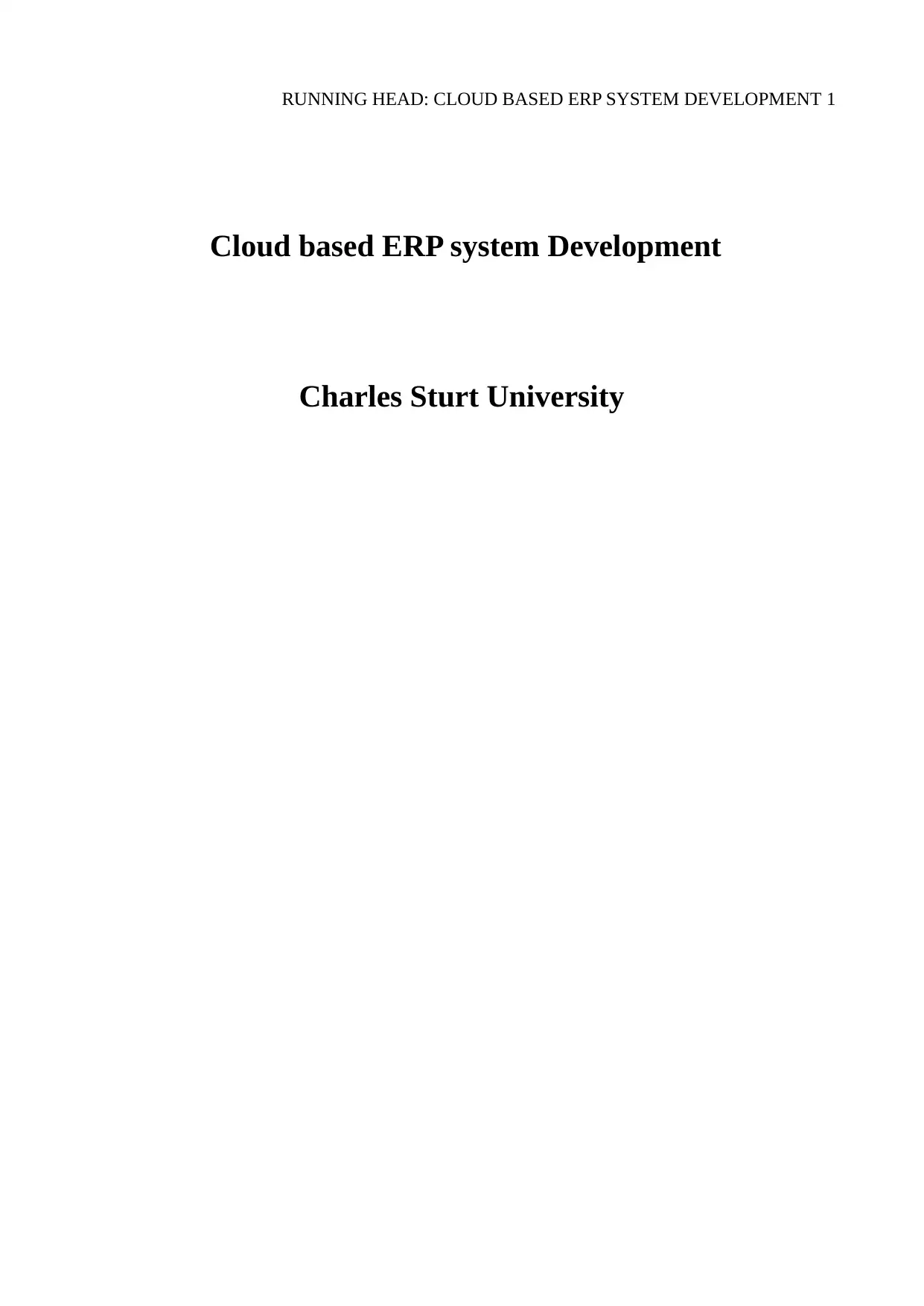
RUNNING HEAD: CLOUD BASED ERP SYSTEM DEVELOPMENT 1
Cloud based ERP system Development
Charles Sturt University
Cloud based ERP system Development
Charles Sturt University
Paraphrase This Document
Need a fresh take? Get an instant paraphrase of this document with our AI Paraphraser
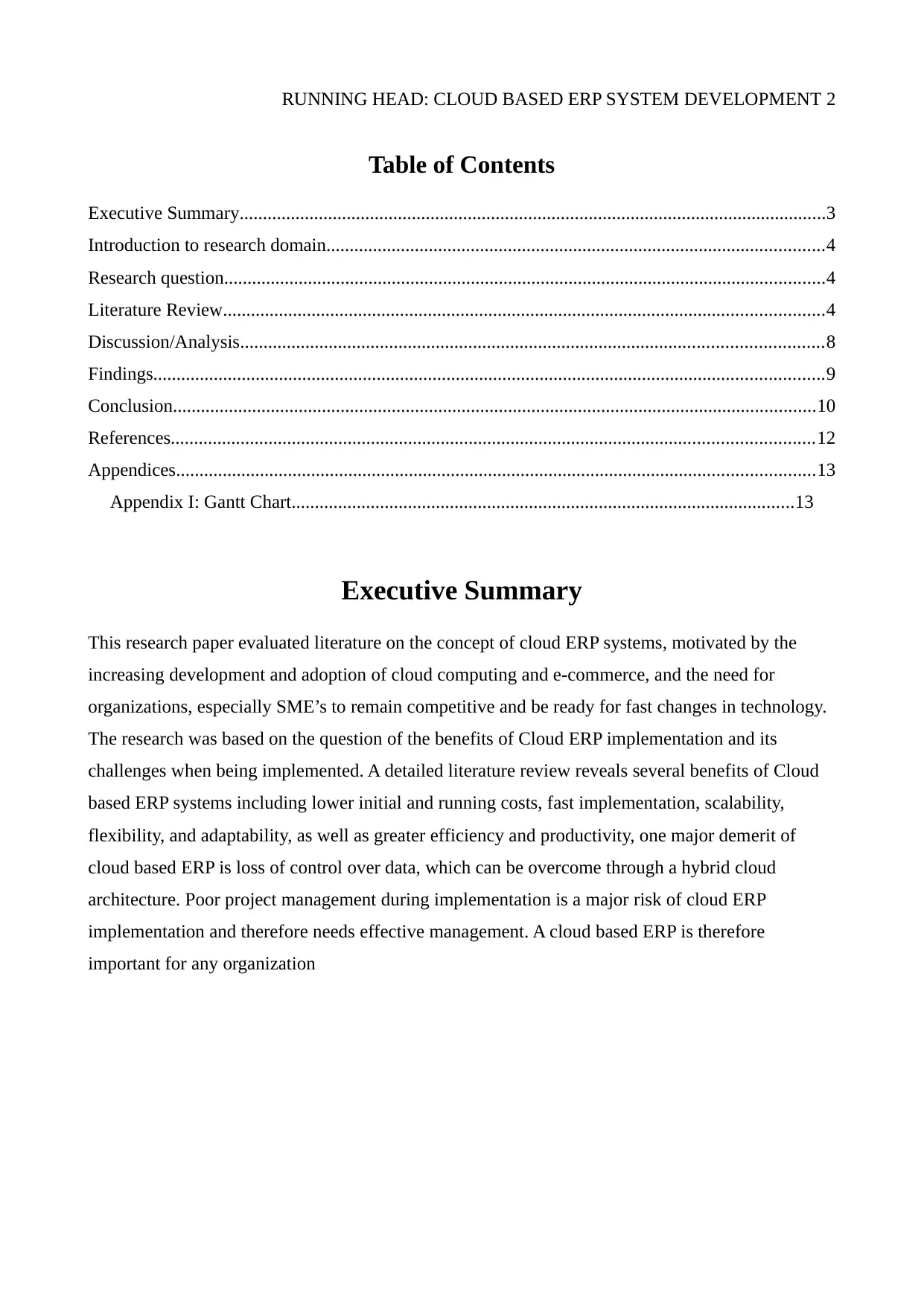
RUNNING HEAD: CLOUD BASED ERP SYSTEM DEVELOPMENT 2
Table of Contents
Executive Summary..............................................................................................................................3
Introduction to research domain...........................................................................................................4
Research question.................................................................................................................................4
Literature Review.................................................................................................................................4
Discussion/Analysis.............................................................................................................................8
Findings................................................................................................................................................9
Conclusion..........................................................................................................................................10
References..........................................................................................................................................12
Appendices.........................................................................................................................................13
Appendix I: Gantt Chart............................................................................................................13
Executive Summary
This research paper evaluated literature on the concept of cloud ERP systems, motivated by the
increasing development and adoption of cloud computing and e-commerce, and the need for
organizations, especially SME’s to remain competitive and be ready for fast changes in technology.
The research was based on the question of the benefits of Cloud ERP implementation and its
challenges when being implemented. A detailed literature review reveals several benefits of Cloud
based ERP systems including lower initial and running costs, fast implementation, scalability,
flexibility, and adaptability, as well as greater efficiency and productivity, one major demerit of
cloud based ERP is loss of control over data, which can be overcome through a hybrid cloud
architecture. Poor project management during implementation is a major risk of cloud ERP
implementation and therefore needs effective management. A cloud based ERP is therefore
important for any organization
Table of Contents
Executive Summary..............................................................................................................................3
Introduction to research domain...........................................................................................................4
Research question.................................................................................................................................4
Literature Review.................................................................................................................................4
Discussion/Analysis.............................................................................................................................8
Findings................................................................................................................................................9
Conclusion..........................................................................................................................................10
References..........................................................................................................................................12
Appendices.........................................................................................................................................13
Appendix I: Gantt Chart............................................................................................................13
Executive Summary
This research paper evaluated literature on the concept of cloud ERP systems, motivated by the
increasing development and adoption of cloud computing and e-commerce, and the need for
organizations, especially SME’s to remain competitive and be ready for fast changes in technology.
The research was based on the question of the benefits of Cloud ERP implementation and its
challenges when being implemented. A detailed literature review reveals several benefits of Cloud
based ERP systems including lower initial and running costs, fast implementation, scalability,
flexibility, and adaptability, as well as greater efficiency and productivity, one major demerit of
cloud based ERP is loss of control over data, which can be overcome through a hybrid cloud
architecture. Poor project management during implementation is a major risk of cloud ERP
implementation and therefore needs effective management. A cloud based ERP is therefore
important for any organization
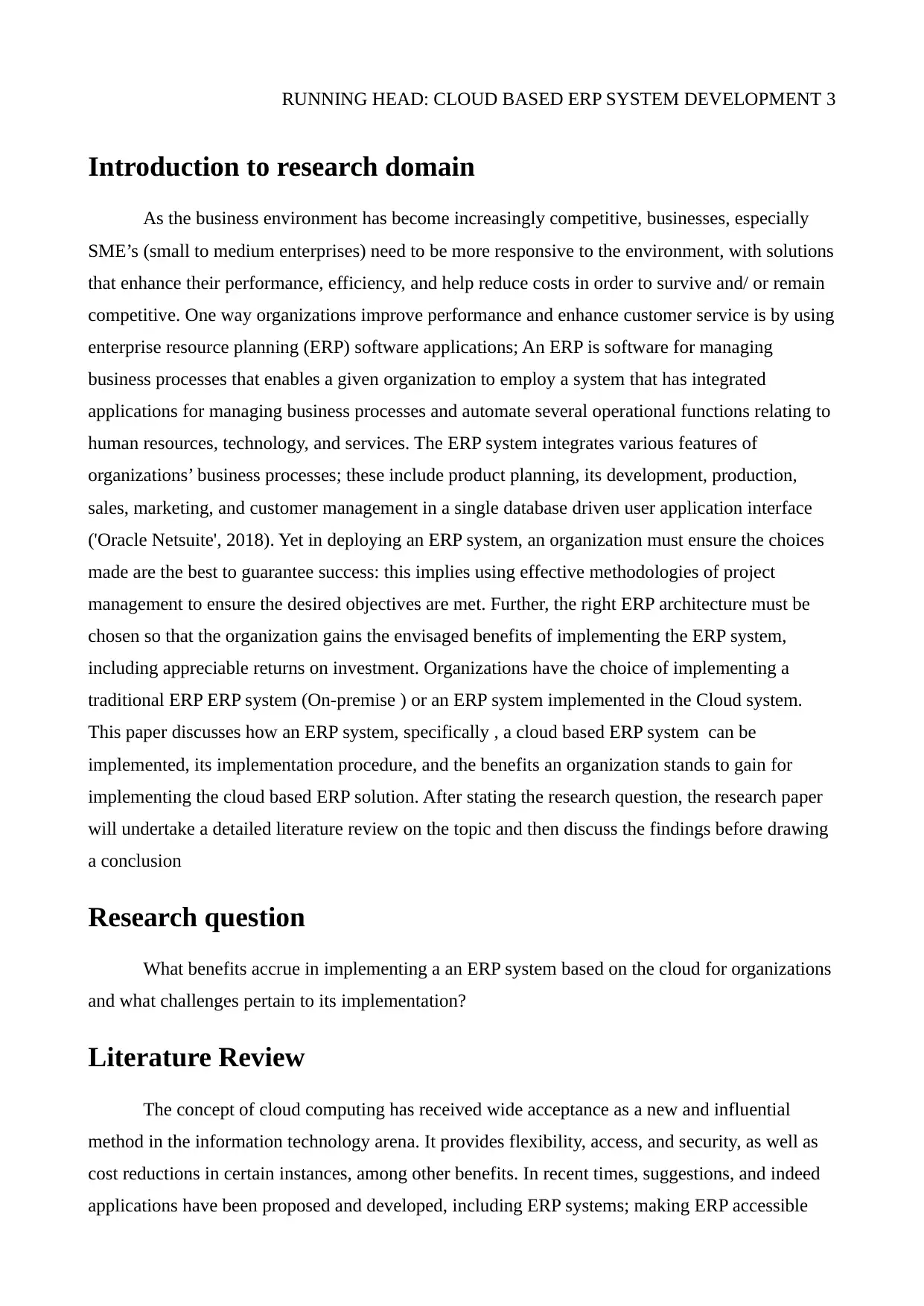
RUNNING HEAD: CLOUD BASED ERP SYSTEM DEVELOPMENT 3
Introduction to research domain
As the business environment has become increasingly competitive, businesses, especially
SME’s (small to medium enterprises) need to be more responsive to the environment, with solutions
that enhance their performance, efficiency, and help reduce costs in order to survive and/ or remain
competitive. One way organizations improve performance and enhance customer service is by using
enterprise resource planning (ERP) software applications; An ERP is software for managing
business processes that enables a given organization to employ a system that has integrated
applications for managing business processes and automate several operational functions relating to
human resources, technology, and services. The ERP system integrates various features of
organizations’ business processes; these include product planning, its development, production,
sales, marketing, and customer management in a single database driven user application interface
('Oracle Netsuite', 2018). Yet in deploying an ERP system, an organization must ensure the choices
made are the best to guarantee success: this implies using effective methodologies of project
management to ensure the desired objectives are met. Further, the right ERP architecture must be
chosen so that the organization gains the envisaged benefits of implementing the ERP system,
including appreciable returns on investment. Organizations have the choice of implementing a
traditional ERP ERP system (On-premise ) or an ERP system implemented in the Cloud system.
This paper discusses how an ERP system, specifically , a cloud based ERP system can be
implemented, its implementation procedure, and the benefits an organization stands to gain for
implementing the cloud based ERP solution. After stating the research question, the research paper
will undertake a detailed literature review on the topic and then discuss the findings before drawing
a conclusion
Research question
What benefits accrue in implementing a an ERP system based on the cloud for organizations
and what challenges pertain to its implementation?
Literature Review
The concept of cloud computing has received wide acceptance as a new and influential
method in the information technology arena. It provides flexibility, access, and security, as well as
cost reductions in certain instances, among other benefits. In recent times, suggestions, and indeed
applications have been proposed and developed, including ERP systems; making ERP accessible
Introduction to research domain
As the business environment has become increasingly competitive, businesses, especially
SME’s (small to medium enterprises) need to be more responsive to the environment, with solutions
that enhance their performance, efficiency, and help reduce costs in order to survive and/ or remain
competitive. One way organizations improve performance and enhance customer service is by using
enterprise resource planning (ERP) software applications; An ERP is software for managing
business processes that enables a given organization to employ a system that has integrated
applications for managing business processes and automate several operational functions relating to
human resources, technology, and services. The ERP system integrates various features of
organizations’ business processes; these include product planning, its development, production,
sales, marketing, and customer management in a single database driven user application interface
('Oracle Netsuite', 2018). Yet in deploying an ERP system, an organization must ensure the choices
made are the best to guarantee success: this implies using effective methodologies of project
management to ensure the desired objectives are met. Further, the right ERP architecture must be
chosen so that the organization gains the envisaged benefits of implementing the ERP system,
including appreciable returns on investment. Organizations have the choice of implementing a
traditional ERP ERP system (On-premise ) or an ERP system implemented in the Cloud system.
This paper discusses how an ERP system, specifically , a cloud based ERP system can be
implemented, its implementation procedure, and the benefits an organization stands to gain for
implementing the cloud based ERP solution. After stating the research question, the research paper
will undertake a detailed literature review on the topic and then discuss the findings before drawing
a conclusion
Research question
What benefits accrue in implementing a an ERP system based on the cloud for organizations
and what challenges pertain to its implementation?
Literature Review
The concept of cloud computing has received wide acceptance as a new and influential
method in the information technology arena. It provides flexibility, access, and security, as well as
cost reductions in certain instances, among other benefits. In recent times, suggestions, and indeed
applications have been proposed and developed, including ERP systems; making ERP accessible
⊘ This is a preview!⊘
Do you want full access?
Subscribe today to unlock all pages.

Trusted by 1+ million students worldwide
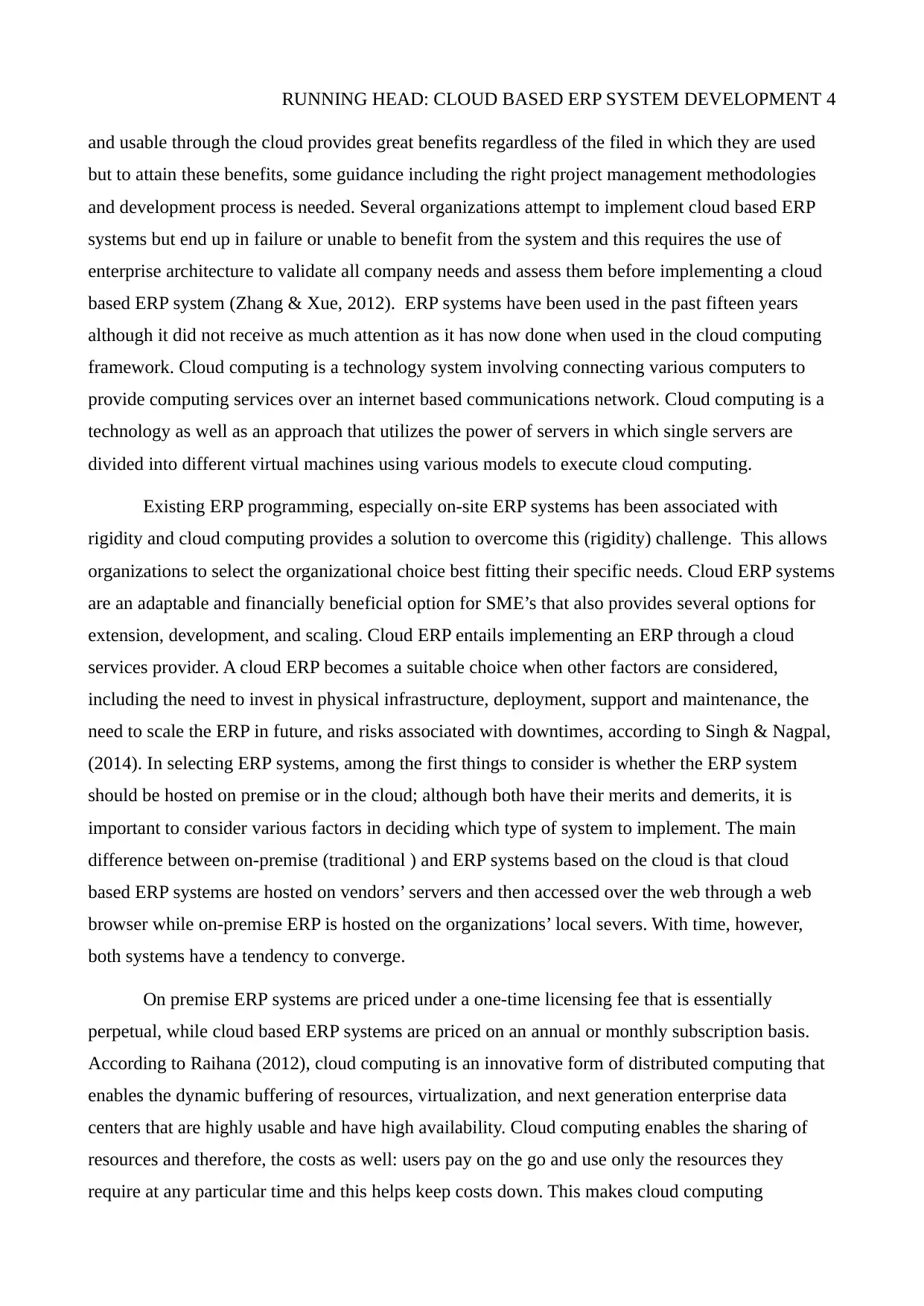
RUNNING HEAD: CLOUD BASED ERP SYSTEM DEVELOPMENT 4
and usable through the cloud provides great benefits regardless of the filed in which they are used
but to attain these benefits, some guidance including the right project management methodologies
and development process is needed. Several organizations attempt to implement cloud based ERP
systems but end up in failure or unable to benefit from the system and this requires the use of
enterprise architecture to validate all company needs and assess them before implementing a cloud
based ERP system (Zhang & Xue, 2012). ERP systems have been used in the past fifteen years
although it did not receive as much attention as it has now done when used in the cloud computing
framework. Cloud computing is a technology system involving connecting various computers to
provide computing services over an internet based communications network. Cloud computing is a
technology as well as an approach that utilizes the power of servers in which single servers are
divided into different virtual machines using various models to execute cloud computing.
Existing ERP programming, especially on-site ERP systems has been associated with
rigidity and cloud computing provides a solution to overcome this (rigidity) challenge. This allows
organizations to select the organizational choice best fitting their specific needs. Cloud ERP systems
are an adaptable and financially beneficial option for SME’s that also provides several options for
extension, development, and scaling. Cloud ERP entails implementing an ERP through a cloud
services provider. A cloud ERP becomes a suitable choice when other factors are considered,
including the need to invest in physical infrastructure, deployment, support and maintenance, the
need to scale the ERP in future, and risks associated with downtimes, according to Singh & Nagpal,
(2014). In selecting ERP systems, among the first things to consider is whether the ERP system
should be hosted on premise or in the cloud; although both have their merits and demerits, it is
important to consider various factors in deciding which type of system to implement. The main
difference between on-premise (traditional ) and ERP systems based on the cloud is that cloud
based ERP systems are hosted on vendors’ servers and then accessed over the web through a web
browser while on-premise ERP is hosted on the organizations’ local severs. With time, however,
both systems have a tendency to converge.
On premise ERP systems are priced under a one-time licensing fee that is essentially
perpetual, while cloud based ERP systems are priced on an annual or monthly subscription basis.
According to Raihana (2012), cloud computing is an innovative form of distributed computing that
enables the dynamic buffering of resources, virtualization, and next generation enterprise data
centers that are highly usable and have high availability. Cloud computing enables the sharing of
resources and therefore, the costs as well: users pay on the go and use only the resources they
require at any particular time and this helps keep costs down. This makes cloud computing
and usable through the cloud provides great benefits regardless of the filed in which they are used
but to attain these benefits, some guidance including the right project management methodologies
and development process is needed. Several organizations attempt to implement cloud based ERP
systems but end up in failure or unable to benefit from the system and this requires the use of
enterprise architecture to validate all company needs and assess them before implementing a cloud
based ERP system (Zhang & Xue, 2012). ERP systems have been used in the past fifteen years
although it did not receive as much attention as it has now done when used in the cloud computing
framework. Cloud computing is a technology system involving connecting various computers to
provide computing services over an internet based communications network. Cloud computing is a
technology as well as an approach that utilizes the power of servers in which single servers are
divided into different virtual machines using various models to execute cloud computing.
Existing ERP programming, especially on-site ERP systems has been associated with
rigidity and cloud computing provides a solution to overcome this (rigidity) challenge. This allows
organizations to select the organizational choice best fitting their specific needs. Cloud ERP systems
are an adaptable and financially beneficial option for SME’s that also provides several options for
extension, development, and scaling. Cloud ERP entails implementing an ERP through a cloud
services provider. A cloud ERP becomes a suitable choice when other factors are considered,
including the need to invest in physical infrastructure, deployment, support and maintenance, the
need to scale the ERP in future, and risks associated with downtimes, according to Singh & Nagpal,
(2014). In selecting ERP systems, among the first things to consider is whether the ERP system
should be hosted on premise or in the cloud; although both have their merits and demerits, it is
important to consider various factors in deciding which type of system to implement. The main
difference between on-premise (traditional ) and ERP systems based on the cloud is that cloud
based ERP systems are hosted on vendors’ servers and then accessed over the web through a web
browser while on-premise ERP is hosted on the organizations’ local severs. With time, however,
both systems have a tendency to converge.
On premise ERP systems are priced under a one-time licensing fee that is essentially
perpetual, while cloud based ERP systems are priced on an annual or monthly subscription basis.
According to Raihana (2012), cloud computing is an innovative form of distributed computing that
enables the dynamic buffering of resources, virtualization, and next generation enterprise data
centers that are highly usable and have high availability. Cloud computing enables the sharing of
resources and therefore, the costs as well: users pay on the go and use only the resources they
require at any particular time and this helps keep costs down. This makes cloud computing
Paraphrase This Document
Need a fresh take? Get an instant paraphrase of this document with our AI Paraphraser
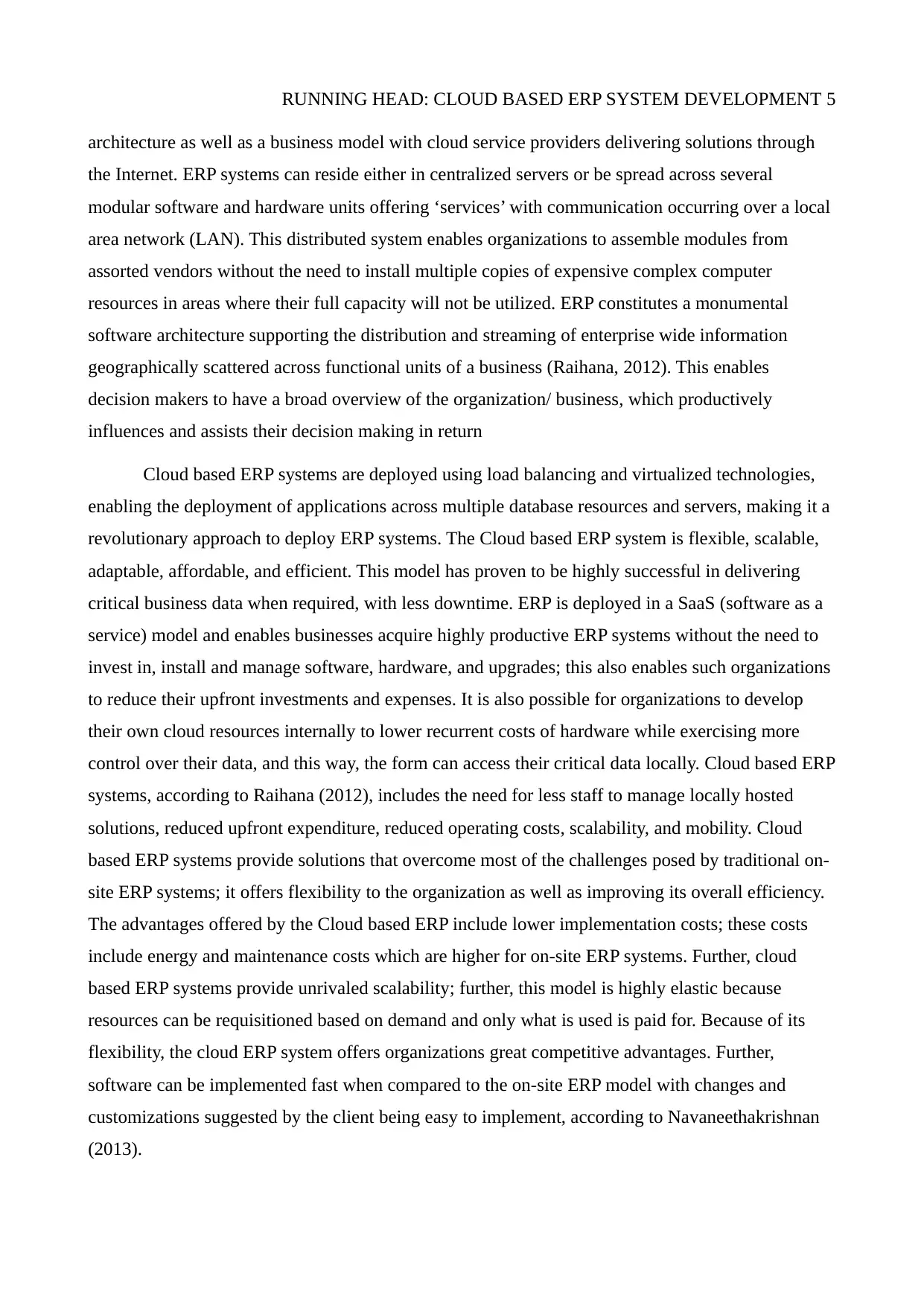
RUNNING HEAD: CLOUD BASED ERP SYSTEM DEVELOPMENT 5
architecture as well as a business model with cloud service providers delivering solutions through
the Internet. ERP systems can reside either in centralized servers or be spread across several
modular software and hardware units offering ‘services’ with communication occurring over a local
area network (LAN). This distributed system enables organizations to assemble modules from
assorted vendors without the need to install multiple copies of expensive complex computer
resources in areas where their full capacity will not be utilized. ERP constitutes a monumental
software architecture supporting the distribution and streaming of enterprise wide information
geographically scattered across functional units of a business (Raihana, 2012). This enables
decision makers to have a broad overview of the organization/ business, which productively
influences and assists their decision making in return
Cloud based ERP systems are deployed using load balancing and virtualized technologies,
enabling the deployment of applications across multiple database resources and servers, making it a
revolutionary approach to deploy ERP systems. The Cloud based ERP system is flexible, scalable,
adaptable, affordable, and efficient. This model has proven to be highly successful in delivering
critical business data when required, with less downtime. ERP is deployed in a SaaS (software as a
service) model and enables businesses acquire highly productive ERP systems without the need to
invest in, install and manage software, hardware, and upgrades; this also enables such organizations
to reduce their upfront investments and expenses. It is also possible for organizations to develop
their own cloud resources internally to lower recurrent costs of hardware while exercising more
control over their data, and this way, the form can access their critical data locally. Cloud based ERP
systems, according to Raihana (2012), includes the need for less staff to manage locally hosted
solutions, reduced upfront expenditure, reduced operating costs, scalability, and mobility. Cloud
based ERP systems provide solutions that overcome most of the challenges posed by traditional on-
site ERP systems; it offers flexibility to the organization as well as improving its overall efficiency.
The advantages offered by the Cloud based ERP include lower implementation costs; these costs
include energy and maintenance costs which are higher for on-site ERP systems. Further, cloud
based ERP systems provide unrivaled scalability; further, this model is highly elastic because
resources can be requisitioned based on demand and only what is used is paid for. Because of its
flexibility, the cloud ERP system offers organizations great competitive advantages. Further,
software can be implemented fast when compared to the on-site ERP model with changes and
customizations suggested by the client being easy to implement, according to Navaneethakrishnan
(2013).
architecture as well as a business model with cloud service providers delivering solutions through
the Internet. ERP systems can reside either in centralized servers or be spread across several
modular software and hardware units offering ‘services’ with communication occurring over a local
area network (LAN). This distributed system enables organizations to assemble modules from
assorted vendors without the need to install multiple copies of expensive complex computer
resources in areas where their full capacity will not be utilized. ERP constitutes a monumental
software architecture supporting the distribution and streaming of enterprise wide information
geographically scattered across functional units of a business (Raihana, 2012). This enables
decision makers to have a broad overview of the organization/ business, which productively
influences and assists their decision making in return
Cloud based ERP systems are deployed using load balancing and virtualized technologies,
enabling the deployment of applications across multiple database resources and servers, making it a
revolutionary approach to deploy ERP systems. The Cloud based ERP system is flexible, scalable,
adaptable, affordable, and efficient. This model has proven to be highly successful in delivering
critical business data when required, with less downtime. ERP is deployed in a SaaS (software as a
service) model and enables businesses acquire highly productive ERP systems without the need to
invest in, install and manage software, hardware, and upgrades; this also enables such organizations
to reduce their upfront investments and expenses. It is also possible for organizations to develop
their own cloud resources internally to lower recurrent costs of hardware while exercising more
control over their data, and this way, the form can access their critical data locally. Cloud based ERP
systems, according to Raihana (2012), includes the need for less staff to manage locally hosted
solutions, reduced upfront expenditure, reduced operating costs, scalability, and mobility. Cloud
based ERP systems provide solutions that overcome most of the challenges posed by traditional on-
site ERP systems; it offers flexibility to the organization as well as improving its overall efficiency.
The advantages offered by the Cloud based ERP include lower implementation costs; these costs
include energy and maintenance costs which are higher for on-site ERP systems. Further, cloud
based ERP systems provide unrivaled scalability; further, this model is highly elastic because
resources can be requisitioned based on demand and only what is used is paid for. Because of its
flexibility, the cloud ERP system offers organizations great competitive advantages. Further,
software can be implemented fast when compared to the on-site ERP model with changes and
customizations suggested by the client being easy to implement, according to Navaneethakrishnan
(2013).
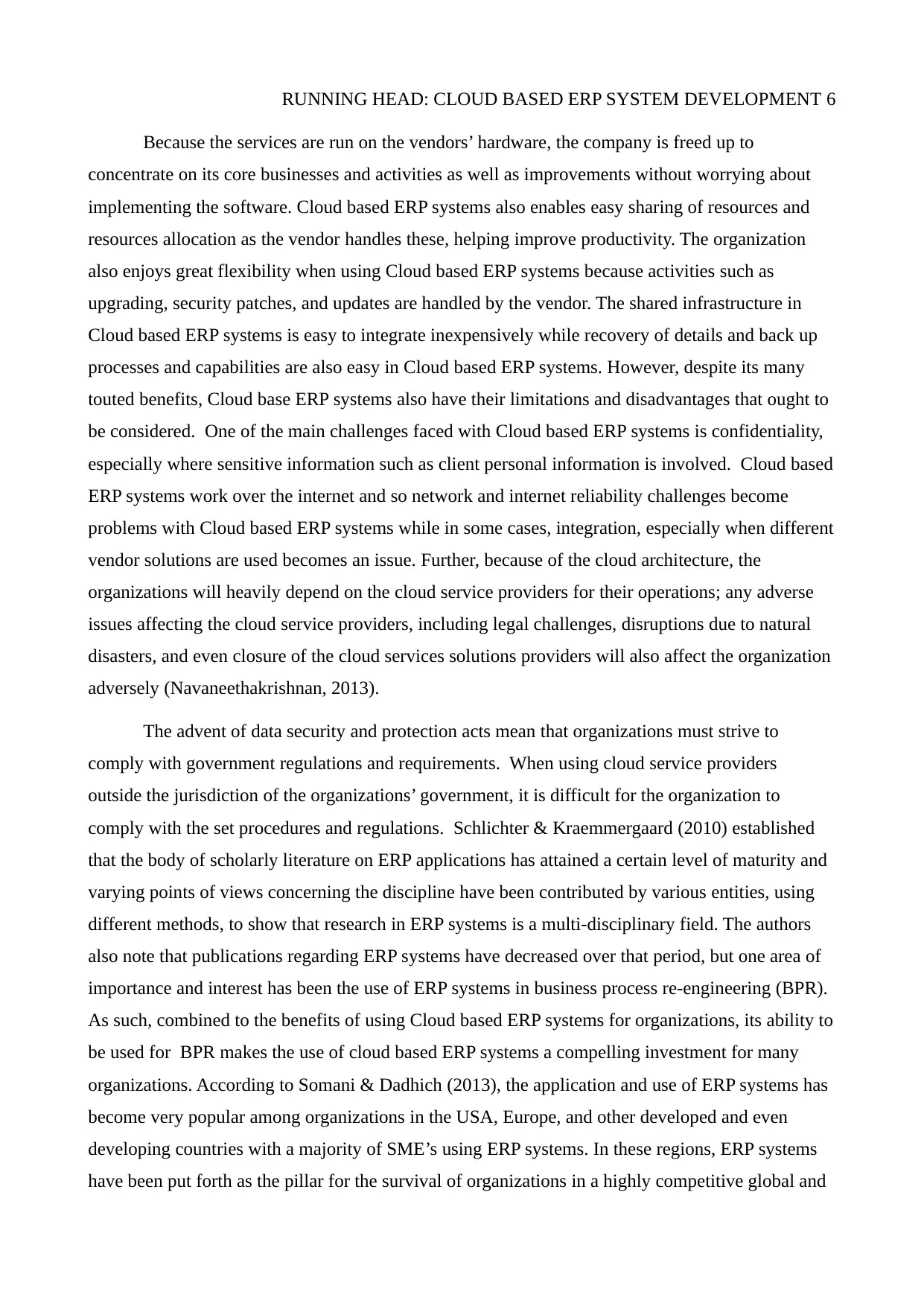
RUNNING HEAD: CLOUD BASED ERP SYSTEM DEVELOPMENT 6
Because the services are run on the vendors’ hardware, the company is freed up to
concentrate on its core businesses and activities as well as improvements without worrying about
implementing the software. Cloud based ERP systems also enables easy sharing of resources and
resources allocation as the vendor handles these, helping improve productivity. The organization
also enjoys great flexibility when using Cloud based ERP systems because activities such as
upgrading, security patches, and updates are handled by the vendor. The shared infrastructure in
Cloud based ERP systems is easy to integrate inexpensively while recovery of details and back up
processes and capabilities are also easy in Cloud based ERP systems. However, despite its many
touted benefits, Cloud base ERP systems also have their limitations and disadvantages that ought to
be considered. One of the main challenges faced with Cloud based ERP systems is confidentiality,
especially where sensitive information such as client personal information is involved. Cloud based
ERP systems work over the internet and so network and internet reliability challenges become
problems with Cloud based ERP systems while in some cases, integration, especially when different
vendor solutions are used becomes an issue. Further, because of the cloud architecture, the
organizations will heavily depend on the cloud service providers for their operations; any adverse
issues affecting the cloud service providers, including legal challenges, disruptions due to natural
disasters, and even closure of the cloud services solutions providers will also affect the organization
adversely (Navaneethakrishnan, 2013).
The advent of data security and protection acts mean that organizations must strive to
comply with government regulations and requirements. When using cloud service providers
outside the jurisdiction of the organizations’ government, it is difficult for the organization to
comply with the set procedures and regulations. Schlichter & Kraemmergaard (2010) established
that the body of scholarly literature on ERP applications has attained a certain level of maturity and
varying points of views concerning the discipline have been contributed by various entities, using
different methods, to show that research in ERP systems is a multi-disciplinary field. The authors
also note that publications regarding ERP systems have decreased over that period, but one area of
importance and interest has been the use of ERP systems in business process re-engineering (BPR).
As such, combined to the benefits of using Cloud based ERP systems for organizations, its ability to
be used for BPR makes the use of cloud based ERP systems a compelling investment for many
organizations. According to Somani & Dadhich (2013), the application and use of ERP systems has
become very popular among organizations in the USA, Europe, and other developed and even
developing countries with a majority of SME’s using ERP systems. In these regions, ERP systems
have been put forth as the pillar for the survival of organizations in a highly competitive global and
Because the services are run on the vendors’ hardware, the company is freed up to
concentrate on its core businesses and activities as well as improvements without worrying about
implementing the software. Cloud based ERP systems also enables easy sharing of resources and
resources allocation as the vendor handles these, helping improve productivity. The organization
also enjoys great flexibility when using Cloud based ERP systems because activities such as
upgrading, security patches, and updates are handled by the vendor. The shared infrastructure in
Cloud based ERP systems is easy to integrate inexpensively while recovery of details and back up
processes and capabilities are also easy in Cloud based ERP systems. However, despite its many
touted benefits, Cloud base ERP systems also have their limitations and disadvantages that ought to
be considered. One of the main challenges faced with Cloud based ERP systems is confidentiality,
especially where sensitive information such as client personal information is involved. Cloud based
ERP systems work over the internet and so network and internet reliability challenges become
problems with Cloud based ERP systems while in some cases, integration, especially when different
vendor solutions are used becomes an issue. Further, because of the cloud architecture, the
organizations will heavily depend on the cloud service providers for their operations; any adverse
issues affecting the cloud service providers, including legal challenges, disruptions due to natural
disasters, and even closure of the cloud services solutions providers will also affect the organization
adversely (Navaneethakrishnan, 2013).
The advent of data security and protection acts mean that organizations must strive to
comply with government regulations and requirements. When using cloud service providers
outside the jurisdiction of the organizations’ government, it is difficult for the organization to
comply with the set procedures and regulations. Schlichter & Kraemmergaard (2010) established
that the body of scholarly literature on ERP applications has attained a certain level of maturity and
varying points of views concerning the discipline have been contributed by various entities, using
different methods, to show that research in ERP systems is a multi-disciplinary field. The authors
also note that publications regarding ERP systems have decreased over that period, but one area of
importance and interest has been the use of ERP systems in business process re-engineering (BPR).
As such, combined to the benefits of using Cloud based ERP systems for organizations, its ability to
be used for BPR makes the use of cloud based ERP systems a compelling investment for many
organizations. According to Somani & Dadhich (2013), the application and use of ERP systems has
become very popular among organizations in the USA, Europe, and other developed and even
developing countries with a majority of SME’s using ERP systems. In these regions, ERP systems
have been put forth as the pillar for the survival of organizations in a highly competitive global and
⊘ This is a preview!⊘
Do you want full access?
Subscribe today to unlock all pages.

Trusted by 1+ million students worldwide
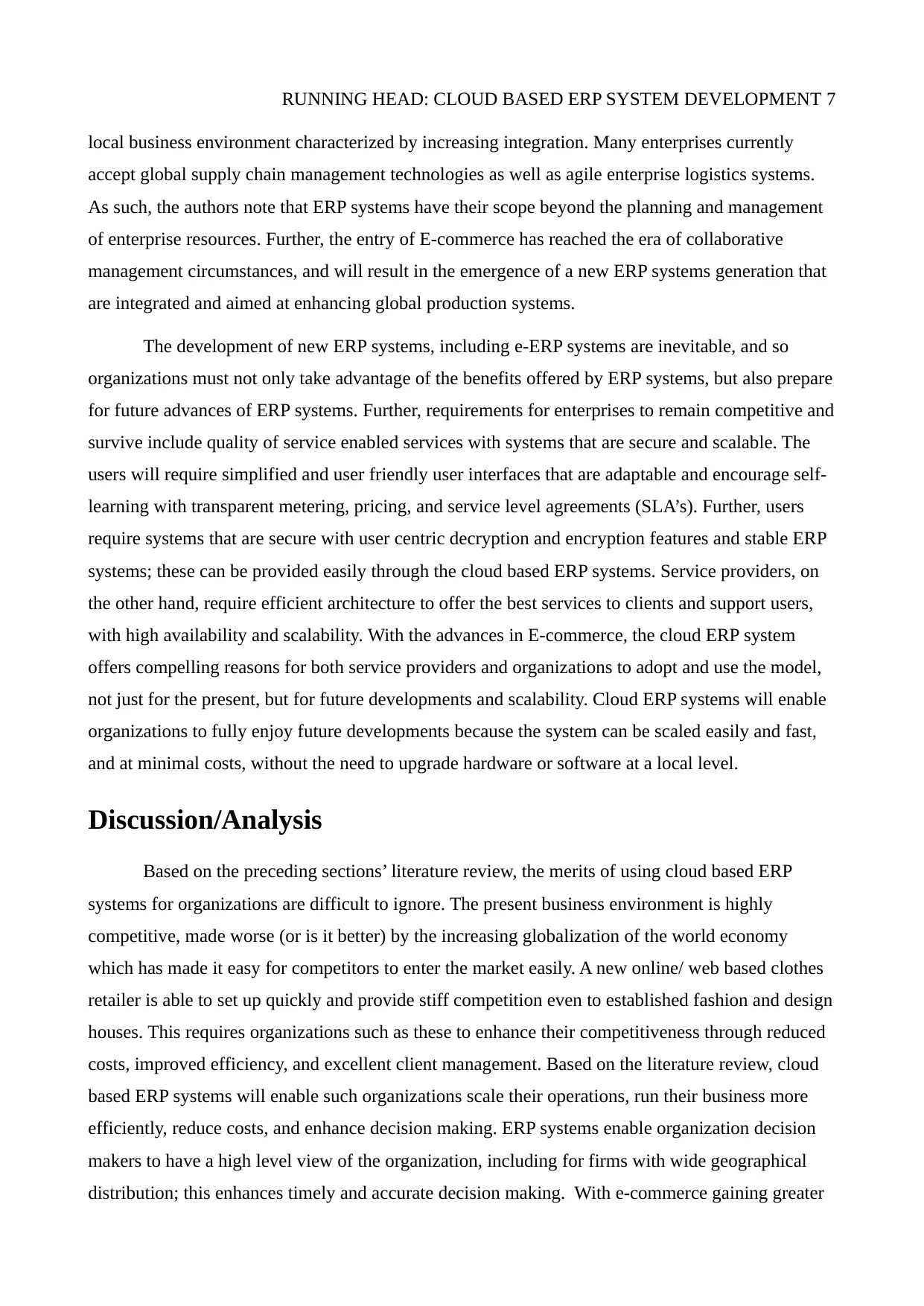
RUNNING HEAD: CLOUD BASED ERP SYSTEM DEVELOPMENT 7
local business environment characterized by increasing integration. Many enterprises currently
accept global supply chain management technologies as well as agile enterprise logistics systems.
As such, the authors note that ERP systems have their scope beyond the planning and management
of enterprise resources. Further, the entry of E-commerce has reached the era of collaborative
management circumstances, and will result in the emergence of a new ERP systems generation that
are integrated and aimed at enhancing global production systems.
The development of new ERP systems, including e-ERP systems are inevitable, and so
organizations must not only take advantage of the benefits offered by ERP systems, but also prepare
for future advances of ERP systems. Further, requirements for enterprises to remain competitive and
survive include quality of service enabled services with systems that are secure and scalable. The
users will require simplified and user friendly user interfaces that are adaptable and encourage self-
learning with transparent metering, pricing, and service level agreements (SLA’s). Further, users
require systems that are secure with user centric decryption and encryption features and stable ERP
systems; these can be provided easily through the cloud based ERP systems. Service providers, on
the other hand, require efficient architecture to offer the best services to clients and support users,
with high availability and scalability. With the advances in E-commerce, the cloud ERP system
offers compelling reasons for both service providers and organizations to adopt and use the model,
not just for the present, but for future developments and scalability. Cloud ERP systems will enable
organizations to fully enjoy future developments because the system can be scaled easily and fast,
and at minimal costs, without the need to upgrade hardware or software at a local level.
Discussion/Analysis
Based on the preceding sections’ literature review, the merits of using cloud based ERP
systems for organizations are difficult to ignore. The present business environment is highly
competitive, made worse (or is it better) by the increasing globalization of the world economy
which has made it easy for competitors to enter the market easily. A new online/ web based clothes
retailer is able to set up quickly and provide stiff competition even to established fashion and design
houses. This requires organizations such as these to enhance their competitiveness through reduced
costs, improved efficiency, and excellent client management. Based on the literature review, cloud
based ERP systems will enable such organizations scale their operations, run their business more
efficiently, reduce costs, and enhance decision making. ERP systems enable organization decision
makers to have a high level view of the organization, including for firms with wide geographical
distribution; this enhances timely and accurate decision making. With e-commerce gaining greater
local business environment characterized by increasing integration. Many enterprises currently
accept global supply chain management technologies as well as agile enterprise logistics systems.
As such, the authors note that ERP systems have their scope beyond the planning and management
of enterprise resources. Further, the entry of E-commerce has reached the era of collaborative
management circumstances, and will result in the emergence of a new ERP systems generation that
are integrated and aimed at enhancing global production systems.
The development of new ERP systems, including e-ERP systems are inevitable, and so
organizations must not only take advantage of the benefits offered by ERP systems, but also prepare
for future advances of ERP systems. Further, requirements for enterprises to remain competitive and
survive include quality of service enabled services with systems that are secure and scalable. The
users will require simplified and user friendly user interfaces that are adaptable and encourage self-
learning with transparent metering, pricing, and service level agreements (SLA’s). Further, users
require systems that are secure with user centric decryption and encryption features and stable ERP
systems; these can be provided easily through the cloud based ERP systems. Service providers, on
the other hand, require efficient architecture to offer the best services to clients and support users,
with high availability and scalability. With the advances in E-commerce, the cloud ERP system
offers compelling reasons for both service providers and organizations to adopt and use the model,
not just for the present, but for future developments and scalability. Cloud ERP systems will enable
organizations to fully enjoy future developments because the system can be scaled easily and fast,
and at minimal costs, without the need to upgrade hardware or software at a local level.
Discussion/Analysis
Based on the preceding sections’ literature review, the merits of using cloud based ERP
systems for organizations are difficult to ignore. The present business environment is highly
competitive, made worse (or is it better) by the increasing globalization of the world economy
which has made it easy for competitors to enter the market easily. A new online/ web based clothes
retailer is able to set up quickly and provide stiff competition even to established fashion and design
houses. This requires organizations such as these to enhance their competitiveness through reduced
costs, improved efficiency, and excellent client management. Based on the literature review, cloud
based ERP systems will enable such organizations scale their operations, run their business more
efficiently, reduce costs, and enhance decision making. ERP systems enable organization decision
makers to have a high level view of the organization, including for firms with wide geographical
distribution; this enhances timely and accurate decision making. With e-commerce gaining greater
Paraphrase This Document
Need a fresh take? Get an instant paraphrase of this document with our AI Paraphraser
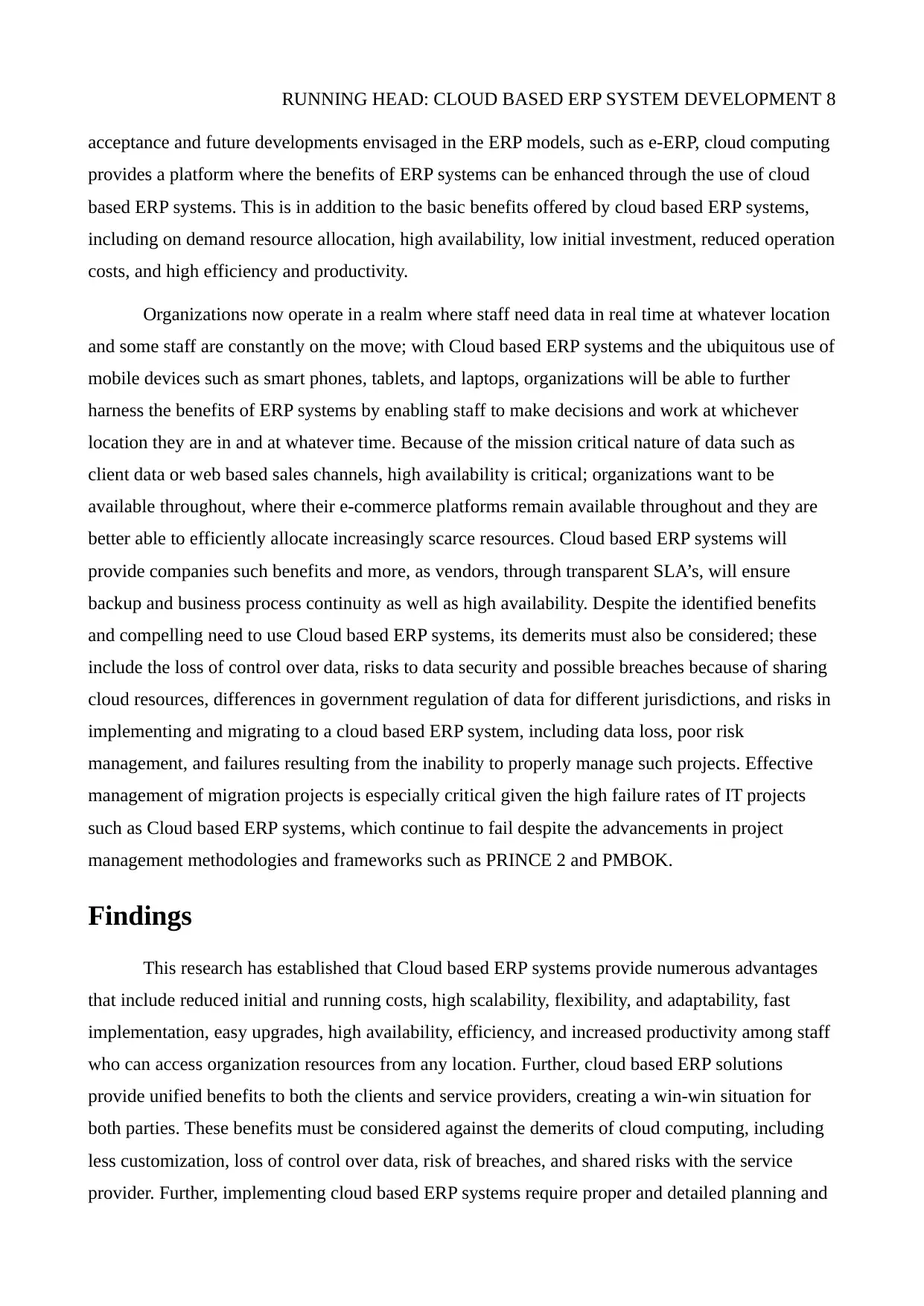
RUNNING HEAD: CLOUD BASED ERP SYSTEM DEVELOPMENT 8
acceptance and future developments envisaged in the ERP models, such as e-ERP, cloud computing
provides a platform where the benefits of ERP systems can be enhanced through the use of cloud
based ERP systems. This is in addition to the basic benefits offered by cloud based ERP systems,
including on demand resource allocation, high availability, low initial investment, reduced operation
costs, and high efficiency and productivity.
Organizations now operate in a realm where staff need data in real time at whatever location
and some staff are constantly on the move; with Cloud based ERP systems and the ubiquitous use of
mobile devices such as smart phones, tablets, and laptops, organizations will be able to further
harness the benefits of ERP systems by enabling staff to make decisions and work at whichever
location they are in and at whatever time. Because of the mission critical nature of data such as
client data or web based sales channels, high availability is critical; organizations want to be
available throughout, where their e-commerce platforms remain available throughout and they are
better able to efficiently allocate increasingly scarce resources. Cloud based ERP systems will
provide companies such benefits and more, as vendors, through transparent SLA’s, will ensure
backup and business process continuity as well as high availability. Despite the identified benefits
and compelling need to use Cloud based ERP systems, its demerits must also be considered; these
include the loss of control over data, risks to data security and possible breaches because of sharing
cloud resources, differences in government regulation of data for different jurisdictions, and risks in
implementing and migrating to a cloud based ERP system, including data loss, poor risk
management, and failures resulting from the inability to properly manage such projects. Effective
management of migration projects is especially critical given the high failure rates of IT projects
such as Cloud based ERP systems, which continue to fail despite the advancements in project
management methodologies and frameworks such as PRINCE 2 and PMBOK.
Findings
This research has established that Cloud based ERP systems provide numerous advantages
that include reduced initial and running costs, high scalability, flexibility, and adaptability, fast
implementation, easy upgrades, high availability, efficiency, and increased productivity among staff
who can access organization resources from any location. Further, cloud based ERP solutions
provide unified benefits to both the clients and service providers, creating a win-win situation for
both parties. These benefits must be considered against the demerits of cloud computing, including
less customization, loss of control over data, risk of breaches, and shared risks with the service
provider. Further, implementing cloud based ERP systems require proper and detailed planning and
acceptance and future developments envisaged in the ERP models, such as e-ERP, cloud computing
provides a platform where the benefits of ERP systems can be enhanced through the use of cloud
based ERP systems. This is in addition to the basic benefits offered by cloud based ERP systems,
including on demand resource allocation, high availability, low initial investment, reduced operation
costs, and high efficiency and productivity.
Organizations now operate in a realm where staff need data in real time at whatever location
and some staff are constantly on the move; with Cloud based ERP systems and the ubiquitous use of
mobile devices such as smart phones, tablets, and laptops, organizations will be able to further
harness the benefits of ERP systems by enabling staff to make decisions and work at whichever
location they are in and at whatever time. Because of the mission critical nature of data such as
client data or web based sales channels, high availability is critical; organizations want to be
available throughout, where their e-commerce platforms remain available throughout and they are
better able to efficiently allocate increasingly scarce resources. Cloud based ERP systems will
provide companies such benefits and more, as vendors, through transparent SLA’s, will ensure
backup and business process continuity as well as high availability. Despite the identified benefits
and compelling need to use Cloud based ERP systems, its demerits must also be considered; these
include the loss of control over data, risks to data security and possible breaches because of sharing
cloud resources, differences in government regulation of data for different jurisdictions, and risks in
implementing and migrating to a cloud based ERP system, including data loss, poor risk
management, and failures resulting from the inability to properly manage such projects. Effective
management of migration projects is especially critical given the high failure rates of IT projects
such as Cloud based ERP systems, which continue to fail despite the advancements in project
management methodologies and frameworks such as PRINCE 2 and PMBOK.
Findings
This research has established that Cloud based ERP systems provide numerous advantages
that include reduced initial and running costs, high scalability, flexibility, and adaptability, fast
implementation, easy upgrades, high availability, efficiency, and increased productivity among staff
who can access organization resources from any location. Further, cloud based ERP solutions
provide unified benefits to both the clients and service providers, creating a win-win situation for
both parties. These benefits must be considered against the demerits of cloud computing, including
less customization, loss of control over data, risk of breaches, and shared risks with the service
provider. Further, implementing cloud based ERP systems require proper and detailed planning and
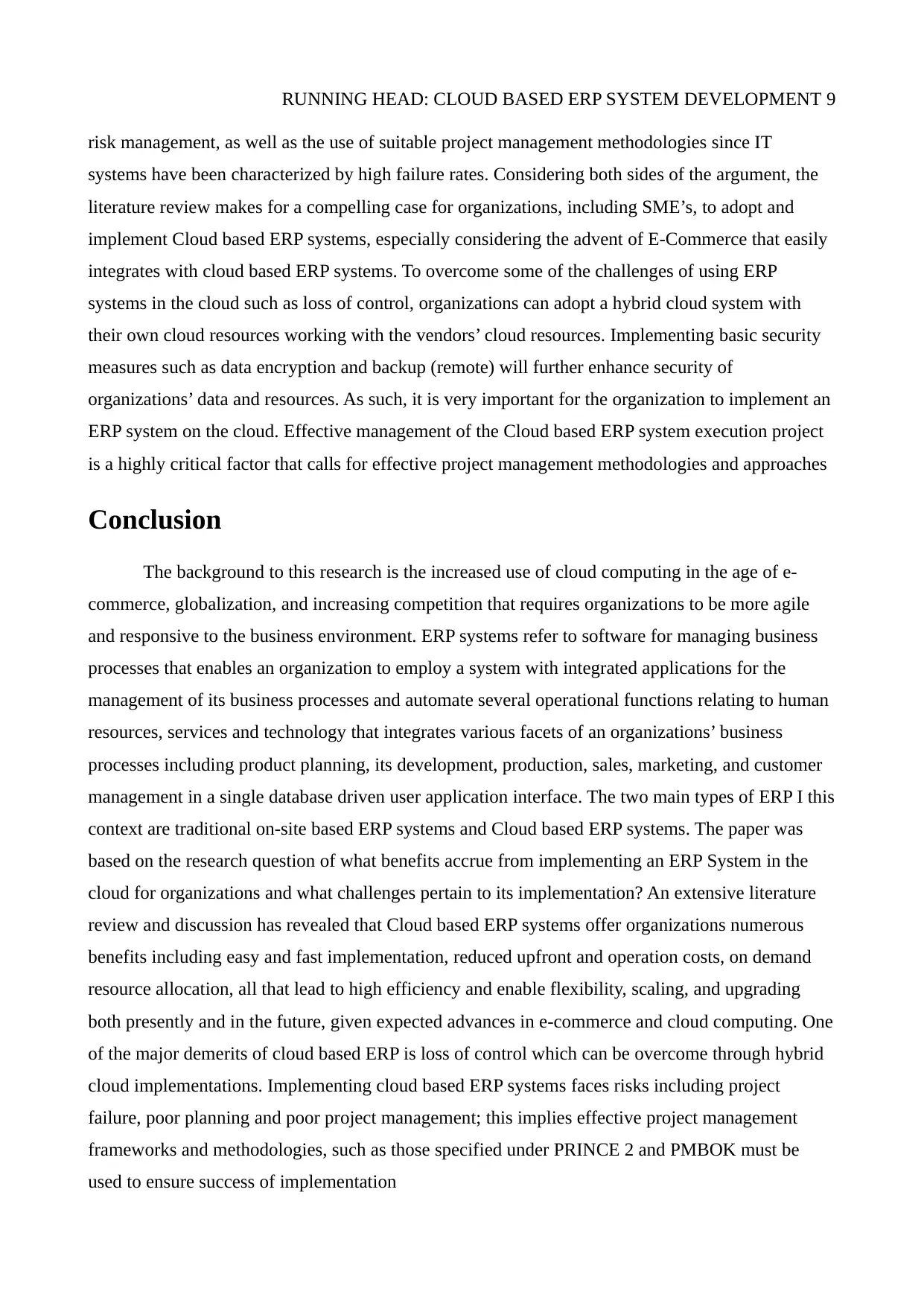
RUNNING HEAD: CLOUD BASED ERP SYSTEM DEVELOPMENT 9
risk management, as well as the use of suitable project management methodologies since IT
systems have been characterized by high failure rates. Considering both sides of the argument, the
literature review makes for a compelling case for organizations, including SME’s, to adopt and
implement Cloud based ERP systems, especially considering the advent of E-Commerce that easily
integrates with cloud based ERP systems. To overcome some of the challenges of using ERP
systems in the cloud such as loss of control, organizations can adopt a hybrid cloud system with
their own cloud resources working with the vendors’ cloud resources. Implementing basic security
measures such as data encryption and backup (remote) will further enhance security of
organizations’ data and resources. As such, it is very important for the organization to implement an
ERP system on the cloud. Effective management of the Cloud based ERP system execution project
is a highly critical factor that calls for effective project management methodologies and approaches
Conclusion
The background to this research is the increased use of cloud computing in the age of e-
commerce, globalization, and increasing competition that requires organizations to be more agile
and responsive to the business environment. ERP systems refer to software for managing business
processes that enables an organization to employ a system with integrated applications for the
management of its business processes and automate several operational functions relating to human
resources, services and technology that integrates various facets of an organizations’ business
processes including product planning, its development, production, sales, marketing, and customer
management in a single database driven user application interface. The two main types of ERP I this
context are traditional on-site based ERP systems and Cloud based ERP systems. The paper was
based on the research question of what benefits accrue from implementing an ERP System in the
cloud for organizations and what challenges pertain to its implementation? An extensive literature
review and discussion has revealed that Cloud based ERP systems offer organizations numerous
benefits including easy and fast implementation, reduced upfront and operation costs, on demand
resource allocation, all that lead to high efficiency and enable flexibility, scaling, and upgrading
both presently and in the future, given expected advances in e-commerce and cloud computing. One
of the major demerits of cloud based ERP is loss of control which can be overcome through hybrid
cloud implementations. Implementing cloud based ERP systems faces risks including project
failure, poor planning and poor project management; this implies effective project management
frameworks and methodologies, such as those specified under PRINCE 2 and PMBOK must be
used to ensure success of implementation
risk management, as well as the use of suitable project management methodologies since IT
systems have been characterized by high failure rates. Considering both sides of the argument, the
literature review makes for a compelling case for organizations, including SME’s, to adopt and
implement Cloud based ERP systems, especially considering the advent of E-Commerce that easily
integrates with cloud based ERP systems. To overcome some of the challenges of using ERP
systems in the cloud such as loss of control, organizations can adopt a hybrid cloud system with
their own cloud resources working with the vendors’ cloud resources. Implementing basic security
measures such as data encryption and backup (remote) will further enhance security of
organizations’ data and resources. As such, it is very important for the organization to implement an
ERP system on the cloud. Effective management of the Cloud based ERP system execution project
is a highly critical factor that calls for effective project management methodologies and approaches
Conclusion
The background to this research is the increased use of cloud computing in the age of e-
commerce, globalization, and increasing competition that requires organizations to be more agile
and responsive to the business environment. ERP systems refer to software for managing business
processes that enables an organization to employ a system with integrated applications for the
management of its business processes and automate several operational functions relating to human
resources, services and technology that integrates various facets of an organizations’ business
processes including product planning, its development, production, sales, marketing, and customer
management in a single database driven user application interface. The two main types of ERP I this
context are traditional on-site based ERP systems and Cloud based ERP systems. The paper was
based on the research question of what benefits accrue from implementing an ERP System in the
cloud for organizations and what challenges pertain to its implementation? An extensive literature
review and discussion has revealed that Cloud based ERP systems offer organizations numerous
benefits including easy and fast implementation, reduced upfront and operation costs, on demand
resource allocation, all that lead to high efficiency and enable flexibility, scaling, and upgrading
both presently and in the future, given expected advances in e-commerce and cloud computing. One
of the major demerits of cloud based ERP is loss of control which can be overcome through hybrid
cloud implementations. Implementing cloud based ERP systems faces risks including project
failure, poor planning and poor project management; this implies effective project management
frameworks and methodologies, such as those specified under PRINCE 2 and PMBOK must be
used to ensure success of implementation
⊘ This is a preview!⊘
Do you want full access?
Subscribe today to unlock all pages.

Trusted by 1+ million students worldwide
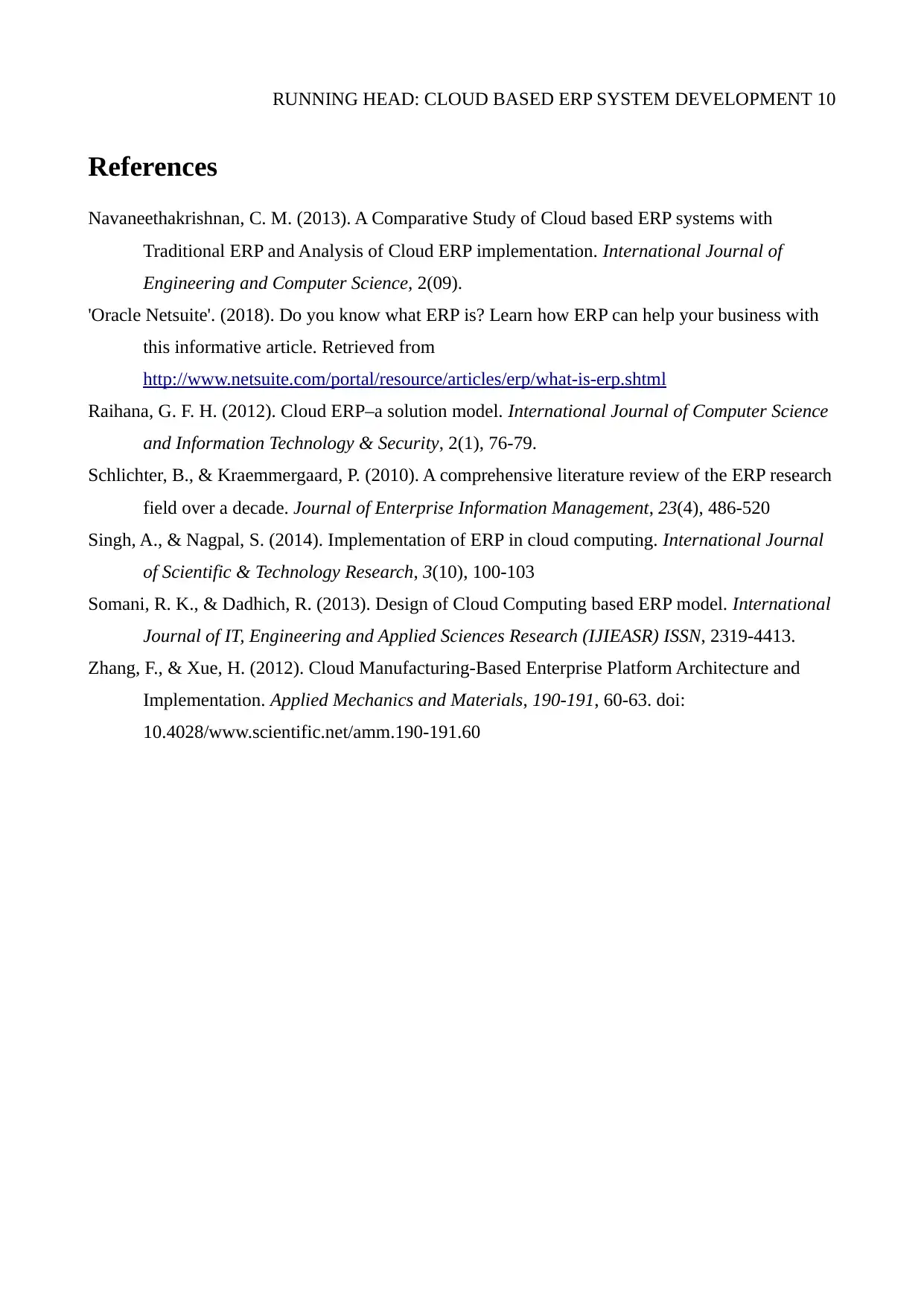
RUNNING HEAD: CLOUD BASED ERP SYSTEM DEVELOPMENT 10
References
Navaneethakrishnan, C. M. (2013). A Comparative Study of Cloud based ERP systems with
Traditional ERP and Analysis of Cloud ERP implementation. International Journal of
Engineering and Computer Science, 2(09).
'Oracle Netsuite'. (2018). Do you know what ERP is? Learn how ERP can help your business with
this informative article. Retrieved from
http://www.netsuite.com/portal/resource/articles/erp/what-is-erp.shtml
Raihana, G. F. H. (2012). Cloud ERP–a solution model. International Journal of Computer Science
and Information Technology & Security, 2(1), 76-79.
Schlichter, B., & Kraemmergaard, P. (2010). A comprehensive literature review of the ERP research
field over a decade. Journal of Enterprise Information Management, 23(4), 486-520
Singh, A., & Nagpal, S. (2014). Implementation of ERP in cloud computing. International Journal
of Scientific & Technology Research, 3(10), 100-103
Somani, R. K., & Dadhich, R. (2013). Design of Cloud Computing based ERP model. International
Journal of IT, Engineering and Applied Sciences Research (IJIEASR) ISSN, 2319-4413.
Zhang, F., & Xue, H. (2012). Cloud Manufacturing-Based Enterprise Platform Architecture and
Implementation. Applied Mechanics and Materials, 190-191, 60-63. doi:
10.4028/www.scientific.net/amm.190-191.60
References
Navaneethakrishnan, C. M. (2013). A Comparative Study of Cloud based ERP systems with
Traditional ERP and Analysis of Cloud ERP implementation. International Journal of
Engineering and Computer Science, 2(09).
'Oracle Netsuite'. (2018). Do you know what ERP is? Learn how ERP can help your business with
this informative article. Retrieved from
http://www.netsuite.com/portal/resource/articles/erp/what-is-erp.shtml
Raihana, G. F. H. (2012). Cloud ERP–a solution model. International Journal of Computer Science
and Information Technology & Security, 2(1), 76-79.
Schlichter, B., & Kraemmergaard, P. (2010). A comprehensive literature review of the ERP research
field over a decade. Journal of Enterprise Information Management, 23(4), 486-520
Singh, A., & Nagpal, S. (2014). Implementation of ERP in cloud computing. International Journal
of Scientific & Technology Research, 3(10), 100-103
Somani, R. K., & Dadhich, R. (2013). Design of Cloud Computing based ERP model. International
Journal of IT, Engineering and Applied Sciences Research (IJIEASR) ISSN, 2319-4413.
Zhang, F., & Xue, H. (2012). Cloud Manufacturing-Based Enterprise Platform Architecture and
Implementation. Applied Mechanics and Materials, 190-191, 60-63. doi:
10.4028/www.scientific.net/amm.190-191.60
Paraphrase This Document
Need a fresh take? Get an instant paraphrase of this document with our AI Paraphraser
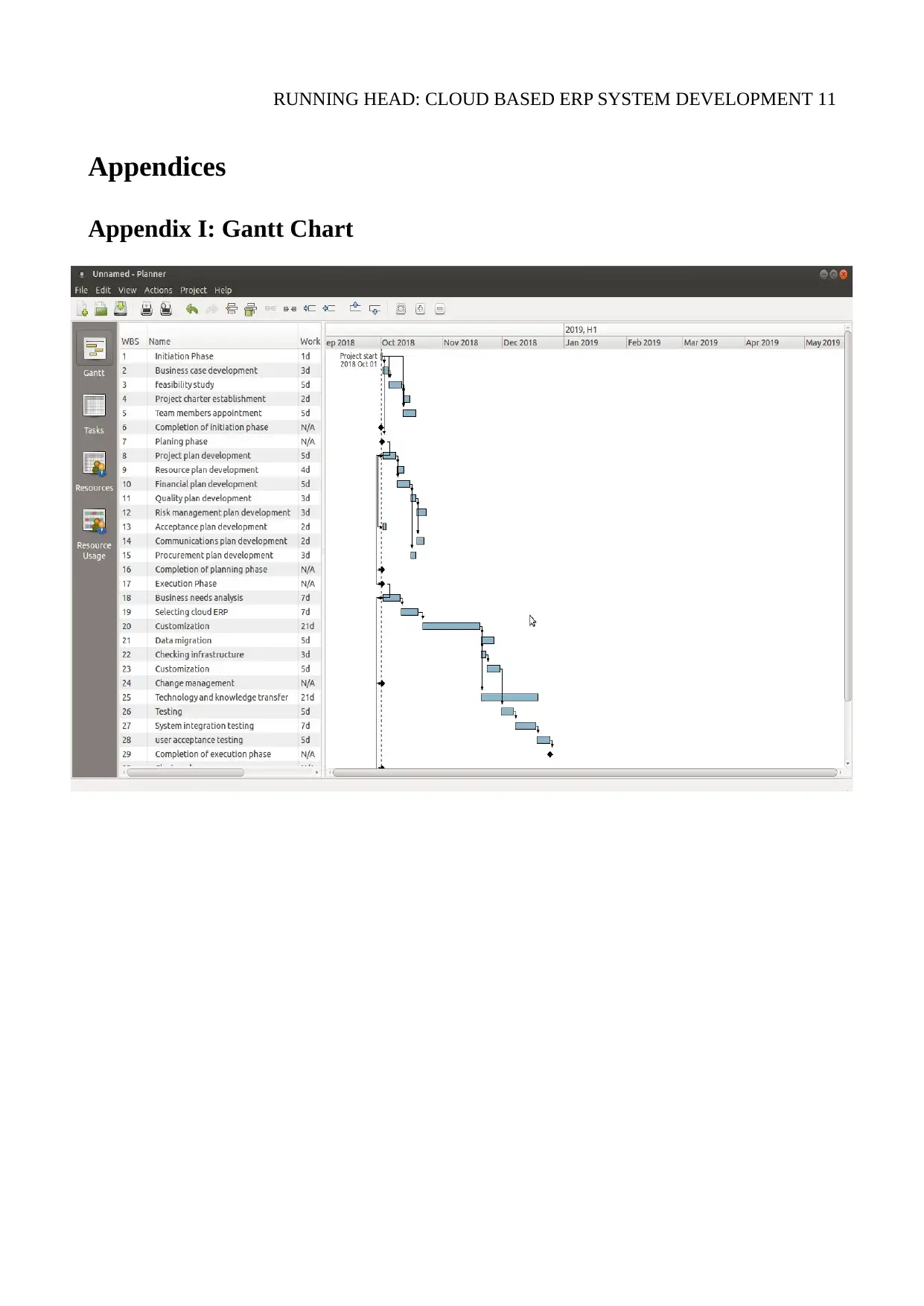
RUNNING HEAD: CLOUD BASED ERP SYSTEM DEVELOPMENT 11
Appendices
Appendix I: Gantt Chart
Appendices
Appendix I: Gantt Chart
1 out of 11
Related Documents
Your All-in-One AI-Powered Toolkit for Academic Success.
+13062052269
info@desklib.com
Available 24*7 on WhatsApp / Email
![[object Object]](/_next/static/media/star-bottom.7253800d.svg)
Unlock your academic potential
Copyright © 2020–2026 A2Z Services. All Rights Reserved. Developed and managed by ZUCOL.





